Hornbills are a group of distinctive birds with horn-shaped bills that are found in tropical and subtropical regions in Africa and certain parts of South Asia. Hornbills often have relatively drab plumage which allows their large and colorful bills to further stand out. These bills are often, though not always, accentuated by a structure along the top of the bill known as a “casque.” (1)
Important to a number of cultures within their native ranges, hornbills are significant both for their unique features as well as their behaviors. Hornbills are monogamous and cooperative. Both males and females dedicate a great deal of energy to childrearing. In some cultures, the hornbill is considered a holy symbol; a king amongst birds. In others, the hornbill is a portend of doom. For anyone interested in studying the hornbill, these birds can provide a wealth of wisdom and insights.
Hornbill Symbolism and Meaning
Hornbills are very territorial and will go to great lengths to protect their nests from other hornbills. When a hornbill pair is preparing to nest, the female will enter a hole or crevice. The pair may find a natural opening in their habitat, or they may take advantage of an abandoned nest from another species. Once the two have found an appropriate nest, the female enters it.
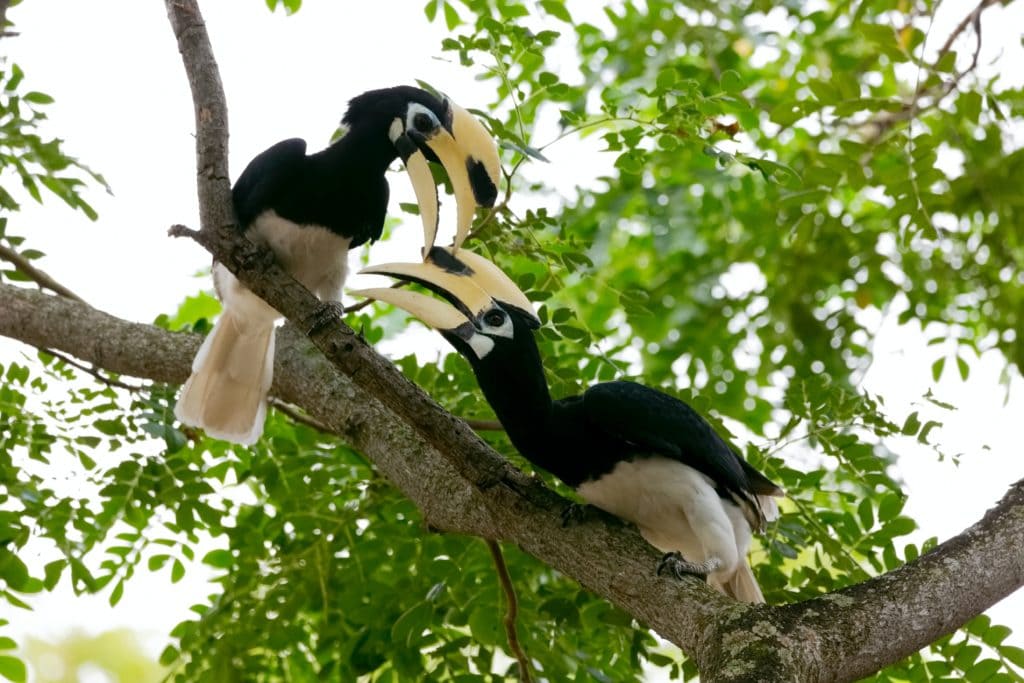
Then, the hornbills close the entrance with mud. The female is entirely enclosed within the nest except for a small opening that is left so that the male can deliver food, often regurgitated fruits, to the female and the chicks. Once the chicks hatch, the male will work tirelessly to bring enough food for the whole family. The female, for her part, will not leave the nest until the chicks are eventually too large to be contained by the nest. At this time, the hornbills will dismantle their mud barrier. (2) While enclosed in the nest, the female undergoes a molt in which she loses all of her feathers. (3)
The enclosed nests of the hornbill represent safety and the sanctity of the family home. Additionally, the different but equally grueling ways in which both parents devote themselves to childrearing represent parenthood and the many sacrifices that mothers and fathers make to secure a future for their children.
The females’ molt represents the transformation that people undergo when they enter parenthood.
Hornbills are known to be monogamous and engage in gift-giving behaviors throughout courtship. Because of this tendency, hornbills can represent thoughtfulness and generosity.
Additionally, the female must deposit waste and droppings outside of the nest to keep it clean for the growing chicks. For this reason, hornbills can represent housekeeping, cleanliness, and the importance of removing sources of impurity or toxicity from one’s space. (4)
Hornbill Christianity Symbolism
In Zulu, the Red-billed Hornbill is called “umkolwana” which means “believer.” This is said to be a reference to the fact that these birds are often seen staring upwards at the sky, even in times of foul weather or drought. (5)
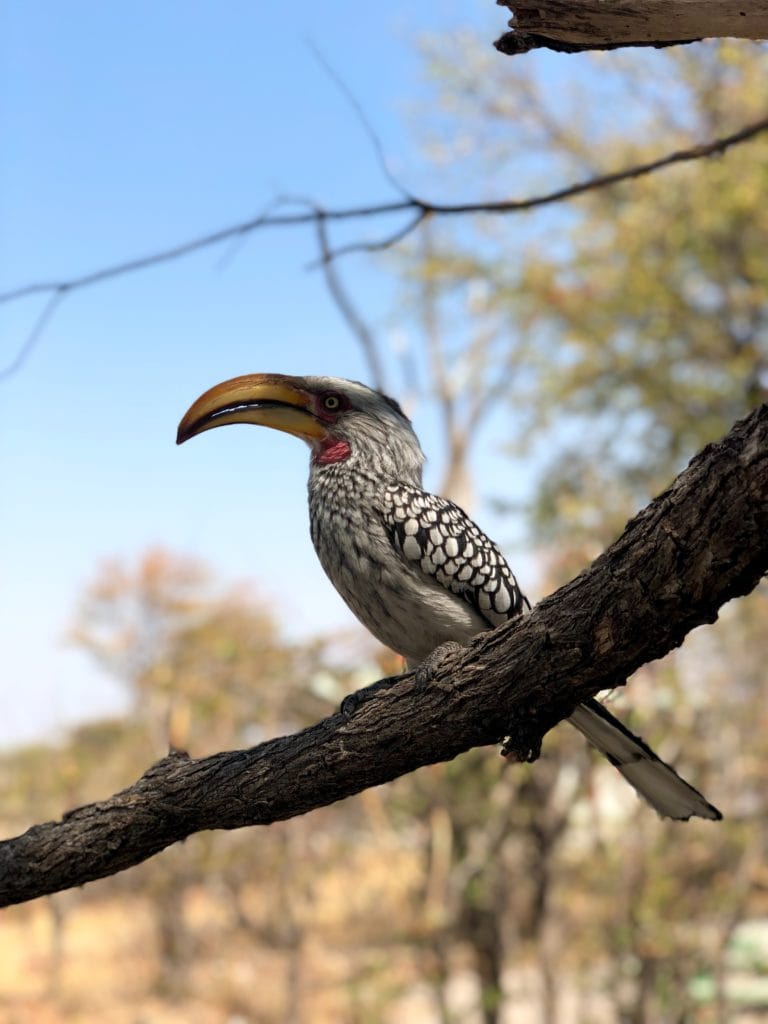
For this reason, the hornbill can be connected with faith. It’s constant focus on higher things can be connected with the importance of trusting God’s plan and looking to heaven in times of struggle.
Hornbill in Dreams
Dreaming of a hornbill can be an important sign. Dreams featuring this bird often pertain to the home or an individual’s internal life and close relationships. This is because of the hornbill’s unique home-making behaviors.
Dreaming of a hornbill nest can mean that you feel isolated or stifled by your close relationships. Perhaps, like the male hornbill, there is someone in your life who nurtures you attentively. Like the female hornbill, this nurturing relationship might be keeping you in one place. Look for ways to expand your horizons and grow as a person without relying too heavily on the people who support you.
Additionally, a hornbill dream may represent an area of your life that needs tidying. The hornbill is meticulous; it deposits waste materials and contaminants outside of its snugly enclosed nest. A hornbill dream may be a warning that something toxic might be building in your home. This can mean that emotions like resentment and restlessness are beginning to build and fester. It may also be a simple reminder to declutter your environment in a much more literal sense.
Hornbill Encounters and Omens
A hornbill encounter often pertains to the family.
Encountering a pair of hornbills may signify an upcoming opportunity to find love or advance and deepen an existing relationship. Such an encounter reminds us to be patient. True love is a partnership which takes a lot of collaboration. The hornbill reminds us not to rush things and to accept them as they come.
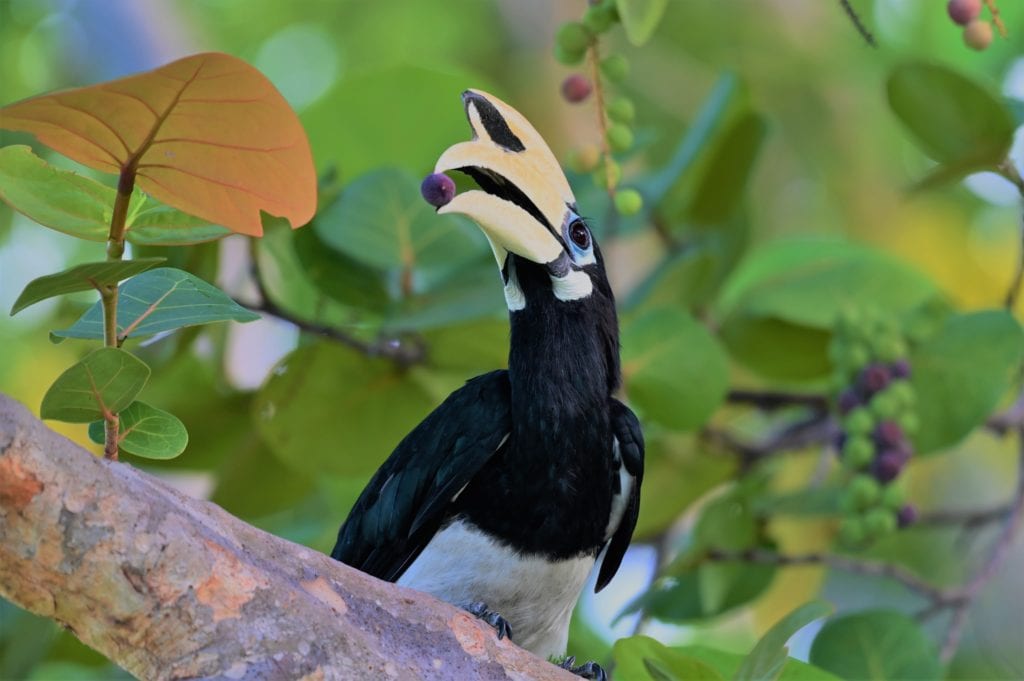
A hornbill encounter may also signify parenthood. This can indicate that your family may soon grow, however it may also be a reminder of the importance of the bond between parents and their children. For parents, this may be a reminder that parenthood is filled with sacrifice, but that it is ultimately rich with blessings. Otherwise, a hornbill encounter may be a sign to appreciate your parents and to look to their sacrifices with gratitude and respect.
Hornbill in Mythology & Folklore
Hornbills are striking animals which hold significance within the regions where they are found. The cultural impact of hornbills, however, has not been limited to Africa and South Asia. Many Westerners, as a matter of fact, may be familiar with the hornbill through its role in a beloved Disney film. Zazu, the royal advisor to Simba and Mufasa in The Lion King, is a Red-billed Hornbill.
South Asian Mythology:
The hornbill is the symbol of the Malaysian state of Sarawak. This state is nicknamed the “land of the hornbills” due to the rich abundance of hornbills found within. Sarawak is home to the indigenous Iban people to whom the hornbill is a crucial cultural symbol. There, the hornbill is considered to be a sacred creature. Hornbills are considered to be the king of birds. They are connected to one of the most powerful gods of the Iban people: Singalang Burong. (6)
The Iban people believe that the hornbill is a messenger between heaven and earth. Additionally, perhaps due to the “war helmet” that hornbills appear to have, these birds are connected with war, ferocity, and conquest. Singalang Burong, the god with whom hornbills are associated, is a powerful war god who is closely connected with visions, prophecies, and justice. (7)
African Mythology:
Hornbills are significant in a number of African myths, superstitions, and fables. In many cases, hornbills are treated as bringers of rain, good fortune, or hope. Contrastingly, though, hornbills are occasionally treated as omens of death. The Zulu associate the Red-billed Hornbill with faith due to its tendency to look towards the skies in times of prosperity and in times of famine and hardship. In the language of the Zulu, the name for this bird means “believer.” (8)
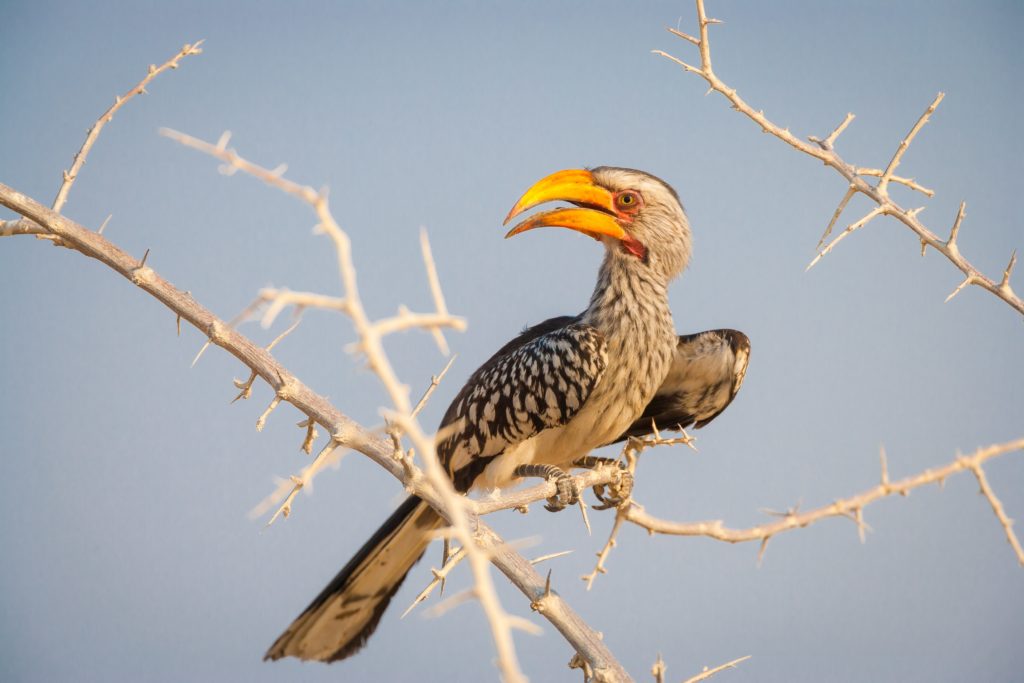
In many African cultures, hornbills are associated with the heavens. In these cases, killing a hornbill is treated as a serious sin.
In other traditions, hornbills are killed for the sake of ritual. For example, hornbills are sometimes killed during times of drought. It is thought that the hornbill is so smelly that the water gods will bring rain to clean out the river if a deceased hornbill is placed there. (9)
One fable featuring the hornbill warns of the dangers of adultery. In this story, a female hornbill sitting atop her eggs is tempted away from the nest by a handsome male. Each day while her mate searches for food, she flies above the trees with this new male. One day her husband returns early and finds her gone. He is enraged when she and her paramour return and he attacks and chases off the other male. It is too late for the poor eggs which had been abandoned each time the mother hornbill had left. (10)
Japanese Mythology:
Netsuke are small ornamental objects used traditionally in Japan to fasten robes. Sashes or cords, used to tie robes, would be looped through the netsuke which acts as a toggle to secure the position. Netsuke are highly decorative and often depict flora and fauna, both real and mythological. Traditionally made from ivory or hardwood, some netsuke have been carved from a material called “hornbill ivory.” (11)
Certain species of hornbill sport prominent “casques” atop their bills. For many of these species, the casque is filled with keratin, creating a thick material that is similar to elephant ivory but somewhat softer and yellow and orange in color. (12)
Hornbill ivory was imported to Japan through South Asia as hornbills are not native to Japan itself. As a result, early Japanese craftsmen were not familiar with the source of hornbill ivory. Through the traders whom they worked with, they learned that this material came from a large exotic bird. It became legend that this material was sourced from the bodies of legendary phoenixes. (13)
The trade of hornbill ivory, which persists in some areas to this day, has driven certain ivory-producing hornbill species to endangerment.
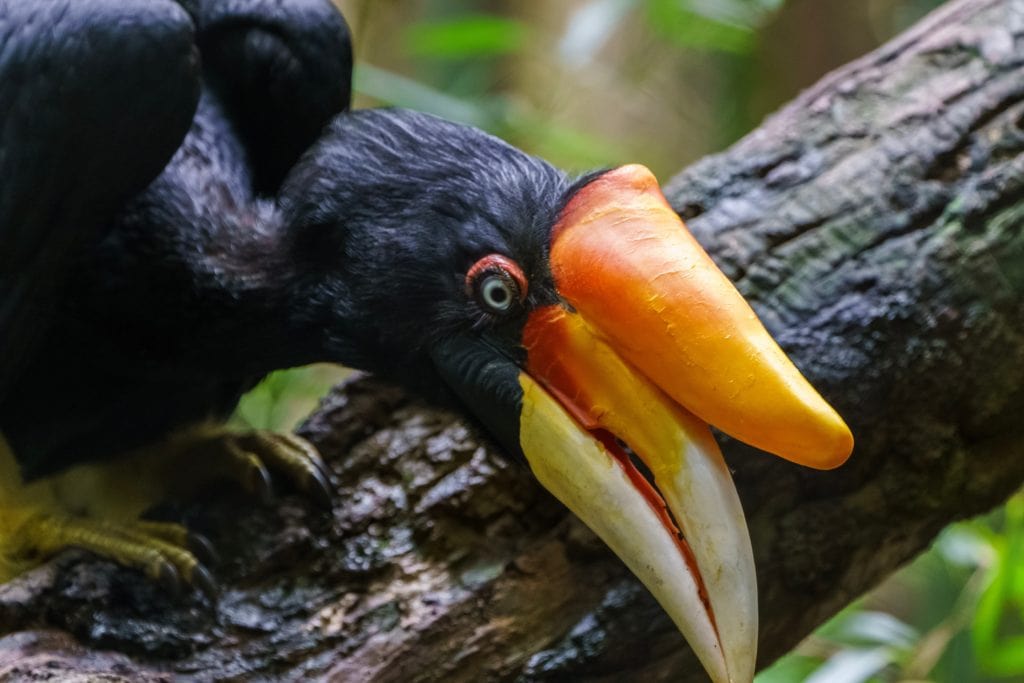
Greek Mythology:
Helmeted Hornbills can be connected with the goddess Artemis. The “casque” which gives these hornbills their name is similar to the protrusion that is the namesake of the Helmeted Guinea Fowl. This bird is a patron animal of the goddess Artemis. Thus, the Helmeted Hornbill can itself be connected with the maiden goddess of the hunt and the moon. (13)
Hornbill Spirit Animal
If the hornbill is your spirit animal then you are probably a family-oriented individual. People with the hornbill spirit animal are often hard-working and industrious. They form intense relationships within their close circles, however they are usually quite closed off to those that they don’t know well.
The hornbill spirit animal is often connected with building things. People with this spirit animal crave safety and stability. If the world doesn’t feel safe to someone with the hornbill spirit animal, then they will do anything they can to build a safe haven.
People with the hornbill spirit animal may enjoy their privacy, but they are not shy. The hornbill spirit animal is very passionate. People with this spirit animal may struggle to contain their emotions and can be prone to anger or jealousy.
Hornbill Totem Animal
Th hornbill totem animal is connected with nurturing and protection. This is especially true for parents, however the hornbill totem can be found in people from all walks of life. People who connect with the hornbill totem animal are empathetic and vigilant. They feel called to protect and care for others, especially those who they see as vulnerable.
Individuals with the hornbill totem animal draw strength from close relationships. They may struggle with rushing into relationships too quickly. It is important that people with the hornbill totem are as protective of themselves as they are of others. It is very easy for someone with this totem to make the mistake of trusting the wrong type of person.
Hornbill Power Animal
The power of the hornbill is connected with messages and visions. People with the hornbill power animal are highly perceptive and attuned to receiving messages from the universe. If the hornbill is your power animal, then treat your open-mindedness and imagination as the gifts that they are. It is these traits which allow you to visualize the future that you desire and to receive spiritual wisdom from unlikely places.
The hornbill power animal can be helpful for warding off negative thoughts or nightmares. It is a reminder that fears and anxieties all stem from the gift of a strong imagination.
Hornbill Tattoo Meaning
Hornbills are excellent subjects for tattoos which represent the family or the home. Additionally, a hornbill tattoo may represent fidelity, faith, and optimism.
An individual with ties to the Malaysian state of Sarawak may choose a hornbill tattoo as a means of representing the “land of the hornbills.”
Conclusion
The hornbill has inspired so many myths and superstitions throughout its native range, even impacting peoples far outside of its range. This distinctive bird is a beautiful example of parenthood and family. Like so many animals, the hornbill reminds us of what is truly important. What’s more, the hornbill reminds us that no amount of hard work and sacrifice is too much when it comes to love.

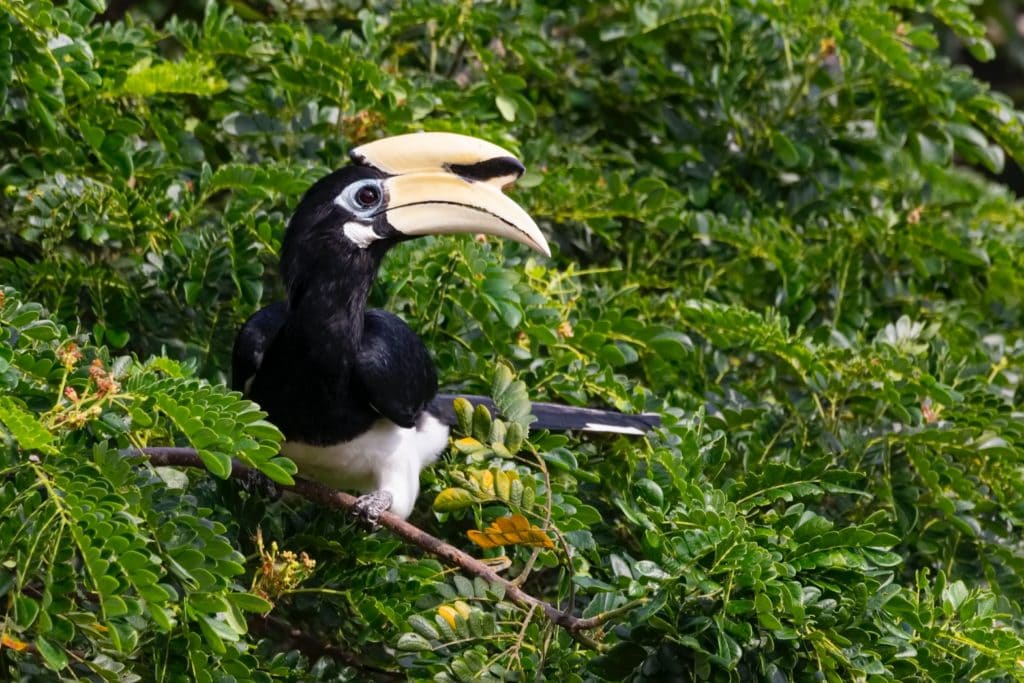
Thanks Halley…
I’ve seen a group of hornbills in thr short grass just before sunrising… It was very strange to see them in this, NorthernCape, SoufhernAfrica area… Defnitely a message…!
Thank you for sharing this. I was sitting in my garden and just spotted ( not the first time ) a pair of hornbills in a big tree. I checked to see what was the meaning and came across your article which resonates so much. Thanks again!
Thank you so much for reading! I’m glad you enjoyed my work!!!
— Hailey Brophy
Writer @ World Birds
Thank you for sharing about birds, I rented an apartment in the outskirts of Kampala and there was a big tree in a forest behind the apartment where I used to see a pair of these hornbill love birds almost each day when I began working from home due to covid shit, covid was perhaps a blessing in disguise. God is great who created these beautiful creatures even in our world today. Glory to His Holy name!!
Thank you for reading! I’m glad to hear you’ve enjoyed my work!!!
— Hailey Brophy
Writer @ World Birds